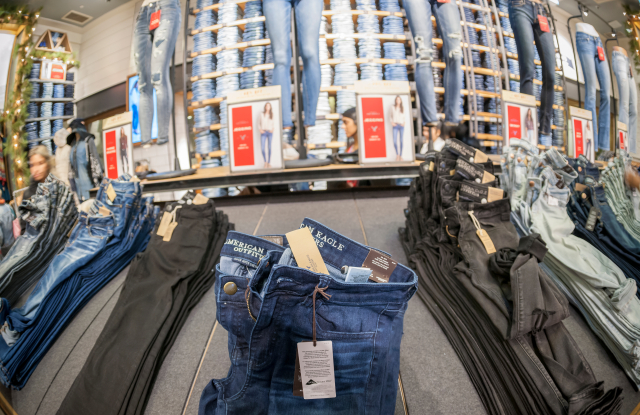
American Eagle Outfitters, Inc. is another U.S.-based retailer to vocalize its sustainability goals with new commitments unveiled today.
By Kaley Roshitsh | Link to article
Inspired by youth, American Eagle Outfitters Inc. is the latest U.S.-based retailer to vocalize its sustainability goals during U.N. climate week, with new commitments unveiled today that extend to 2040.
A focus on “youth and their optimism,” according to Jay Schottenstein, executive chairman and chief executive officer of American Eagle in a press statement, is what guides the new initiatives.
The new goals include proposing carbon neutrality across all of the company’s owned and operated facilities, (including its offices, distribution centers and over 1,000 stores) by 2030.
American Eagle also signed on to reduce its carbon emissions 40 percent by 2030 and 60 percent by 2040 in AEO’s manufacturing, whereas the G7 Fashion Pact instates zero greenhouse gas emissions by 2050. The U.S.-based signatories to the nonbinding Fashion Pact include Capri Holdings, Nike, Nordstrom, PVH and Tapestry.
While a swell of attention on sustainability goals has garnered optimism, it still leaves some confusion over which science-based targets are more attainable, and how urgent efforts need to be to stop, and in some cases — reverse (through vast reforestation and carbon-capture efforts) drastic climate change.
The goals posed by American Eagle also include the following implementations throughout the company’s supply chain by 2023: recycling half of the water in its laundries, reducing water usage by 30 percent in its jeans, removing hazardous chemicals from wastewater, ensuring all cotton is sustainably sourced, recycling bras and jeans in stores, among others.
As for its product material, AEO also calls for half of its polyester used to be “sustainable polyester,” as recycled polyester is less damaging environmentally. It also looks to source viscose from “non-endangered forests.”
Like with many of the fashion and apparel brands today, AEO ensures that its commitment is “ongoing.”
A recent report from Simon-Kucher & Partners, which surveyed over 750 cross-demographic consumers, revealed that only 12 percent of consumers agree that products “must be made of 100 percent sustainable materials.” And those respondents would pay a premium for profit-driven companies that incorporate sustainable practices.
